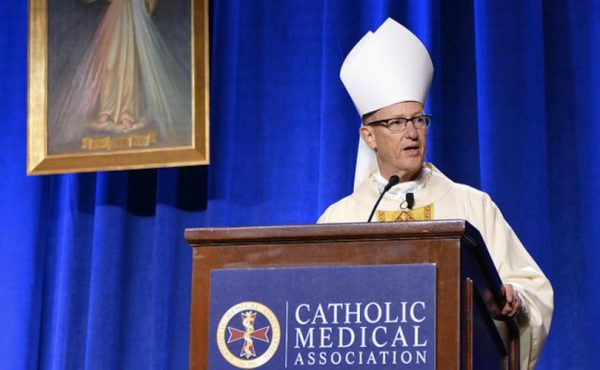Bishop’s Column
The cost of contraception and the joy of the Gospel of Life
Friday, 20 July 2018
By Bishop James Conley
Fewer babies were born in the United States last year than in any other year in the past 30. The birth and the fertility rates in the US continue to plunge, and the decline isn’t expected to slow down for more than a decade.
The US fertility rate is well below the replacement level needed to maintain a stable population. This means that the American population will get older in the decades to come—that 40 years from now, senior citizens will make up 25% of the entire US population. Declining fertility rates mean labor shortages, shrinking tax bases, and insolvent social safety nets.
There are social costs to all choices, including the choices of a contraceptive culture—the choices couples make to delay childbirth, to limit the number of children they have, or to avoid childbirth altogether.
Of course, the costs of our contraceptive culture are not a surprise to many Catholics, but they are worth remembering during this 50th anniversary year of the papal encyclical, Humanae Vitae, promulgated by Pope Paul VI on July 25, 1968.
As is well known, Pope Paul VI taught that a contraception mentality would lead to an increase in marital infidelity and a “general lowering of moral standards,” disrespect for and objectification of women, and government intrusion by way of aggressive population control programs that violate the sovereignty of the family. The past few years have demonstrated, in stereo, the veracity of those prophetic expectations. It is clear that the social costs of a contraceptive mentality go beyond the economic and political costs of a self-imposed demographic winter.
In fact, writing in his 1994 encyclical Evangelium Vitae, Pope St. John Paul II wrote that the most profound costs of our culture’s “contraceptive mentality” are that they foster the sense that conceiving and bearing children is unnatural, that the gift of new life is an undesirable inconvenience and therefore should be avoided at all costs.
The pontiff wrote that “despite their differences of nature and moral gravity, contraception and abortion are often closely connected, as fruits of the same tree.”
Contraception conditions men and women, and therefore the cultures which they form, to deny the obvious and intrinsic relationship between sex and the conception of new life. Contraception pits couples into a kind of unknowing war with themselves: they seek to discover one another, and themselves, in the mutual exchange and intimate embrace of sexuality, while, at the very same time, seeking to deny an essential component of their actual identity. It is as if they are saying to one another, “yes, I’m yours, but not all of me.” This subtle and unknowing war with the partner and with the self inevitably leads to alienation, to atomization, and, eventually, to a kind of loneliness.
I have learned this in more than three decades of pastoral experience, in which I have seen the consequences of the use of contraception on marriages, and on husbands and wives, who desire to live in real freedom and real love, but who become despondent over the ways in which denying their fecundity—which reflects God’s own life giving image—leads to a distorted self-image and a deflated sense of love’s potential.
Contraception has robbed couples of the fullness of marital intimacy for decades, and this is an abject tragedy.
Married love, Pope Paul VI wrote in Humanae Vitae, is “above all, an act of the free will, whose trust is such that it is meant not only to survive the joys and sorrows of daily life, but also to grow, so that husband and wife become in a way one heart and one soul, and together attain their human fulfillment.”
Such love, the encyclical said, which is expressed in a free and mutual self-donation “is not confined wholly to the loving interchange of husband and wife; it also contrives to go beyond this to bring new life into being.”
The message of Humanae Vitae is that the full experience of married love requires “a love which is total—that very special form of personal friendship in which husband and wife generously share everything, allowing no unreasonable exceptions and not thinking solely of their own convenience. Whoever really loves his partner loves not only for what he receives, but loves that partner for the partner’s own sake, content to be able to enrich the other with the gift of himself.”
Such love is a fount of holiness. While the contraceptive mentality requires that we deny fundamental parts of our identity, rendering freedom impossible, true married love, which is open to the gift of life, allows us to discover the richness of being created in God’s image.
While the contraceptive mentality leads to a stark atomization, and a true loneliness; true married love leads to new life, to richer relationships, and to unity with God, who is a trinitarian communion of love.
The personal, familial, and social effects of the ubiquitous use of contraception are manifestly self-evident. As a pastor, what most concerns me now is how to stem this tide—how to help couples choose to live in accord with God’s plan for a joy-filled marriage, which is, demonstrably, God’s plan for basic human flourishing.
As we remember the 50th anniversary of Humanae Vitae’s promulgation, I pray that we have the courage to be “missionaries of the Gospel of Life” give witness to the joy, the peace, and the freedom that comes from living in trust and fidelity to God’s plan for human happiness and flourishing.
Bishop James Conley
Episcopal adviser CMA-USA









